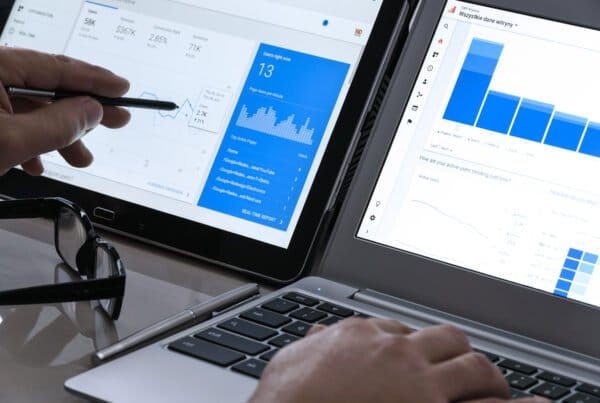Do you know how many leads your website is generating, or how many visitors view it on a monthly basis? Do you know which visitors take action? Percentage of visitors that lead to a conversion goal? If you’re unsure of these answers and don’t know where to get them, you’re not effectively measuring your website. Collecting analytics and metrics for websites is crucial to measuring the success of and knowing how to improve your online marketing campaign.
What are Analytics and Metrics?

Web analytics is the measurement, collection, analysis and reporting of web data for the purpose of understanding and optimizing web usage. It is important to know who is viewing the page, what they’re doing on the page, how much time they’re spending, etc. Analytics is an extremely valuable tool in measuring the effectiveness of your website and marketing. Some components of web analytics include: page views, page time viewed, exit rate, session duration, active time, bounce rate, engagement time, and frequency. Also web analytics includes demographic and geographic information about your customers showing you how they are reaching your site and other information unique to that specific user such as: device used to access your website, screen resolution, operating system of their device, and much more.
Metrics, otherwise known as performance metrics, measure the performance and activities of an organization. Essentially, they are used to evaluate what the company is doing versus what the consumers need. Metrics make use of the analytic data- applying it to figure out how and where the marketing can be improved and how to better meet the needs of the consumer.
Web analytics and performance metrics are used together to evaluate the success of your website and online marketing campaign. The data that can be obtained is remarkable and can really help provide an understanding of how your consumers are viewing and using your site. After identifying this data and gaining an understanding, changes can be made to better meet the needs of the consumer and improve the effectiveness of the website.
Why are Analytics and Metrics Important?

It’s simple. The more information you have, the better off you are. Analytics will show you tons of information from the click path your visitors take to how long they spend on each page. With some data you can even see what areas of each page a visitor looks at most (even if they are not clicking) by using a “heat map” feature. While some of this information may seem unimportant to you, most of it is really valuable. It can lead you to identify which elements of the page the visitors really respond to and which elements need work. You might wonder why is no one calling? Why is no one filling out the contact form on our home page? Why are pages and products you thought were going to be big ticket items lacking in traffic and sales? This data can help you theorize both problems and solutions.
Analytics and metrics are extremely important in evaluating the effectiveness of your website and your marketing campaign. Without the use of these two components you’re guessing; you have no way of knowing how many people visited your site or how much time they spent there or even if their time there was effective or a waste.
Online Marketing is only as effective as your ability to measure it. And, if you don’t know that it’s effective you have no idea if you’re making a return on investment. Why spend money on a website that isn’t working?
How Is The Data Collected?
There are many websites that offer analytical platforms, one of the most popular being Google Analytics. Some other analytic platforms include; Yahoo Web Analytics, Open Web Analytics and Crazy Egg. Some analytic platforms will also integrate seamless into your CMS. For example Google Analytics has a WordPress plugin that enables you to track your traffic stats right from your WordPress dashboard.
What If I Don’t Track Metrics?
Not tracking website metrics can essentially equal missed opportunities. Monitoring your website metrics can provide you with information about your consumers that you did not already have. This can lead you to change your marketing plan, or target specific populations. If you don’t pay attention to the metrics, you lose these opportunities. Most website owners do not take the time to track or understand this data which means if you do, you are one step ahead of the game. Use that to your advantage to create and find opportunities that you may not have otherwise known about.
Many website owners treat their site like a brochure but ideally it is a lead generation tool. If you’re not tracking metrics, it may be a complete waste of time and money and you may never see the value in your online investment. Or, on the other hand, if you use the data to your advantage it could be the prime source of consumers. You can’t know this unless you track it. If it’s not working, you want to know so you can make changes and if it’s working exceptionally well that’s really valuable information too.

One of the most powerful concepts uncovered in data tracking are trends and behaviors. Often similar customers will respond and behave in similar ways. When you identify these patterns that are working in your favor you can then replicate or get better results elsewhere following their lead. For example, one of your product pages you have a BUY NOW button near the top of the page. And even though its not the best product you offer, you notice more visitors click this button most likely because its in plain view and they did not have to work to find it. You can test this theory by placing a similar button on other pages of the site and see if that produces similar results.
What Can This Data Do?

Well let’s put it plainly… this data can identify a crappy website and give you the data needed to turn what once might have been trash, into treasure. It has the potential to completely change your online marketing campaign, for the better. It gives you the ability to understand and track what once was unknown and immeasurable. If you’re not using analytics and metrics, you need to be. The only way to ensure your website’s success is to evaluate the data and make changes as you go. How else might you know where your visitors are clicking most? What areas of a particular page are not getting any interaction? What pages are getting little to no traffic? The longer and more in depth you can analyze these figures the easier it is to see trends, patterns, and behaviors of your most common visitors.
Figure out what your consumers want and change your site to reflect that. Also, monitor what’s going on regularly as the more often you measure results the better you’ll become working with the analytics tools as well as understanding the data in front of you. Most of all, use this available technology to your advantage and make your website a successful one!












